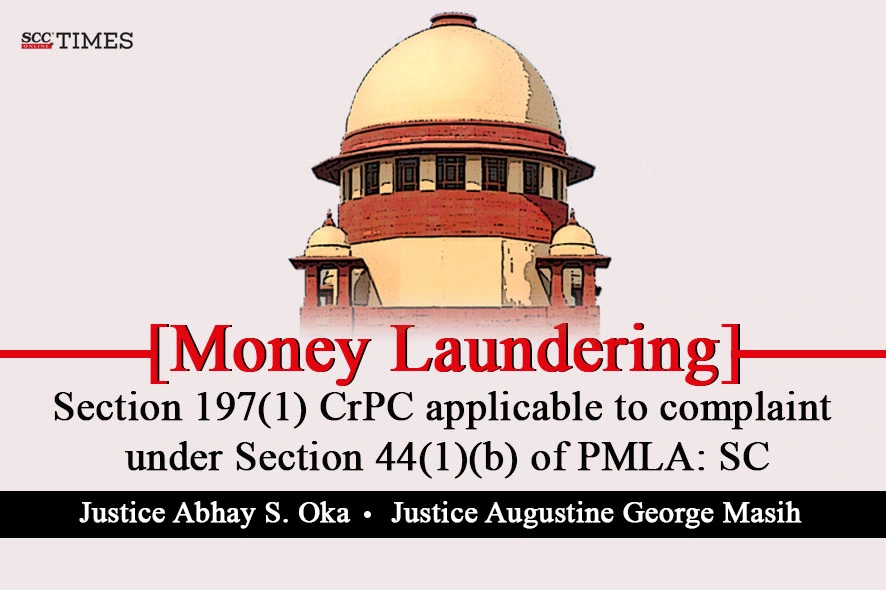Supreme Court: While considering the instant appeal by Enforcement Directorate challenging Telangana High Court’s decision to quash complaint under Section 44(1)(b), Prevention of Money Laundering Act, 2002 (PMLA) against the respondents for failure to obtain prior sanction under Section 197(1), CrPC; the Division Bench of Abhay S. Oka* and Augustine George Masih, JJ., held that considering the object of Section 197(1), CrPC, its applicability cannot be excluded unless there is any provision in the PMLA which is inconsistent with Section 197(1). Hence, the provisions of Section 197(1), CrPC are applicable to a complaint under Section 44(1)(b) of PMLA.
Background:
It was alleged that the 1st Respondent, who was the Vice Chairman and Managing Director of Andhra Pradesh Industrial Infrastructure Corporation Ltd., in conspiracy and connivance with the then Chief Minister of the state, allotted 250 acres of land for the SEZ project to Indu Tech Zone Private Ltd. by violating the existing norms, regulations and procedures. Further allegation against the first respondent is that he was indirectly involved in the offence of money laundering by knowingly assisting Indu group of companies in the creation of vast proceeds of crime. While the 2nd Respondent who at the relevant time was the Principal Secretary with the State Government, extended favour to India Cement Limited by allotting an additional 10 lakh litres of water from River Kagna without referring the matter to Interstate Water Resources Authority and by violating the existing norms, regulations and procedures.
The Enforcement Directorate (ED) filed a complaint against the Respondents under Section 44(1)(b), PMLA for offences under Section 3, PMLA punishable under Section 4, PMLA. The Special Court took cognizance of the matter and issued summons to the Respondents.
Aggrieved, the Respondents approached Telangana High Court seeking quashment of complaint, as no prior sanction under Section 197(1), CrPC was obtained against them. The High Court in its impugned order, accepted the Respondents’ contention, thereby quashing the complaint and leading to the instant appeal by the ED.
Contentions:
The appellant contended that in view of Section 71 of the PMLA, the provisions thereof have an overriding effect over the provisions of the other statutes, including the CrPC. It was submitted that considering the object of the PMLA, the requirement of obtaining a sanction under Section 197(1), CrPC will be inconsistent with the provisions of the PMLA. It was further submitted that 1st Respondent was not a public servant within the meaning of Section 197(1), CrPC, as it cannot be said that while holding the said position, he was not removable from the office save by or with the sanction of the Government.
Per contra, the Respondents argued that the power to appoint a Director of the Corporation and power to remove him vested in the State Government. Therefore, the 1st Respondent continued to be a public servant as contemplated by Section 197(1), CrPC.
Court’s Assessment and Findings:
Perusing Section 197(1), CrPC1, the Court noted that the provision’s object is to protect the public servants from prosecutions. It ensures that the public servants are not prosecuted for anything they do in the discharge of their duties. This provision is for the protection of honest and sincere officers. However, the protection is not unqualified. They can be prosecuted with a previous sanction from the appropriate government. Referring to relevant precedents, the Court stated that the expression “to have been committed by him while acting or purporting to act in the discharge of his official duty” has been judicially interpreted.
The Court found that in the instant case, after completing the investigation, the ED filed exhaustive complaints under Section 44(1)(b) of the PMLA. Cognizance has been taken based on the complaints. Therefore, the issue of the absence of sanction will arise at this stage.
Taking note of the official positions of the Respondents at the relevant period and perusing relevant clauses of the Memorandum and Articles of Association of Andhra Pradesh Industrial Infrastructure Corporation Ltd., the Court found that the appointment of the 1st Respondent as a Director and subsequently as the Managing Director had been made by the State Government; hence, the 1st Respondent was a civil servant.
It was further pointed out that Section 197(1) enumerates 2 conditions for its applicability- firstly, accused must be public servant removable from his office by or with the government’s sanction; secondly, the offence alleged to have been committed by the public servant while acting or purporting to act in the discharge of his duty. The Court found that both the Respondents satisfied the first condition.
The Court further pointed out that there is no embargo on considering the plea of absence of sanction, after cognizance is taken by the Special Court of the offences punishable under Section 4 of the PMLA.
Further on perusing the complaint, the Court observed that in the instant case, the acts alleged against the Respondents are related to the discharge of the duties entrusted to them. It is not even the allegation in the complaints that the two Respondents were not empowered to do the acts they have done. There is a connection between their duties and the acts complained about. Hence the second condition under Section 197(1) also stands satisfied.
Further concerning the applicability of Section 197(1), CrPC, the Court perused Sections 65 and 71 of PMLA, and pointed out that Section 65 makes the provisions of the CrPC applicable to all proceedings under the PMLA, provided the same are not inconsistent with the provisions contained in the PMLA. The words ‘All other proceedings’ include a complaint under Section 44(1)(b) of the PMLA. Section 71 gives an overriding effect to the provisions of the PMLA notwithstanding anything inconsistent therewith contained in any other law for the time being in force.
The Court explained that Section 65 is a prior section which specifically makes the provisions of the CrPC applicable to PMLA, subject to the condition that only those provisions of the CrPC will apply which are not inconsistent with the provisions of the PMLA.
The Court explained and held that a provision of CrPC, made applicable to the PMLA by the virtue of Section 65, will not be overridden by Section 71. Such provisions of CrPC will continue to apply to the PMLA, notwithstanding Section 71.
“If Section 71 is held applicable to such provisions of the CrPC, which apply to the PMLA by virtue of Section 65, such interpretation will render Section 65 otiose. No law can be interpreted in a manner which will render any of its provisions redundant”.
Hence the Court affirmed the correctness of the High Court’s decision to quash the complaints against the Respondents based on the afore-stated assessment. The Court clarified that it will be open for the ED to move the Special Court to take cognizance of the offence against the two respondents if a sanction under Section 197(1), CrPC is granted in future.
CASE DETAILS
|
Citation: Appellants : Respondents : |
Advocates who appeared in this case For Petitioner(s): For Respondent(s): |
CORAM :
1. which corresponds to Section 218 of Nagarik Suraksha Sanhita, 2023








